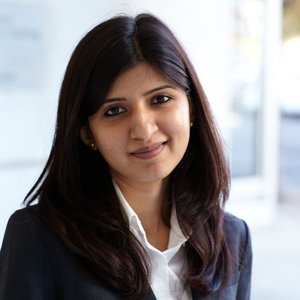"Digital health, mHealth & medtech are moving at tremendous pace in India"
August 17, 2015 | Monday | Interviews | By Rahul Koul Koul
"Digital health, mHealth & medtech are moving at tremendous pace in India"
Dr Nishita Rai,,executive director, HITLAB, New York.
Q: What is the purpose behind organizing such an event in India and especially at Indian Institute of Technology (IIT) Delhi?
Our purpose in organizing the HITLAB Innovators Summit India and the HITLAB World Cup India is to accelerate the diffusion of transformational digital health innovations.
HITLAB has worked for over 15 years to identify elements that are critical to the development, production, approval, distribution, and implementation of public health and medical advancements. The Summit and World Cup held in New Delhi offered an important platform to launch these ideas for the benefit of India and indeed the world.
One of the most critical elements that HITLAB has found in its research is the element of collaboration. The HITLAB Innovators Summit India provides a thoughtfully designed space for those interested in changing the way healthcare is delivered and received, enabling participants to congregate, collaborate, and partner to address Indian healthcare challenges. The HITLAB World Cup India serves as a natural extension of the Summit, providing innovators with a stage to showcase their digital health innovations and obtain feedback from experts in the room. Our goal throughout this event was to emphasize the value of collaboration, which seems amiss in the current collection of meetings involving digital health.
We chose to have this Summit at IIT Delhi to emphasize the importance of higher education institutions as one of the cornerstones of global innovation.
Q: What were the takeaways from it and the way forward to your activities in India?
The key takeaway from the HITLAB Innovators Summit India is that digital health, mHealth, and medtech are moving at a tremendous pace in India, demonstrating the potential to revolutionize health delivery and outcomes in the country. This was apparent in hearing the contributions made by our speakers and panelists, who outlined how the digital health space is being pushed forward in both the public and private sectors. The Summit brought together leading professionals working in mHealth and digital health, spanning government groups, multi-lateral agencies, pharmaceutical companies, private investors, startups, foundations, universities, hospitals, medtech corporations, and others. It was fascinating to see how seemingly different organizations are approaching a common goal: improving the impact and reach of mobile and digital health technologies.
Q: How do you perceive the Indian healthcare scenario and the challenges that remain to be addressed?
The Indian health context seems extremely open to innovation and change. The opportunity to positively impact access, affordability, and quality in the Indian ecosystem has never been greater. Prime Minister Modi has introduced numerous innovative programs and understands the opportunities inherent in having a citizenry largely armed with mobile phones. So whether it involves implementing technology like MOTECH or a national texting program, many of the challenges that remain are seemingly in reach of resolution.
Q: Are you satisfied with the way healthcare startups in India are going? Is real innovation happening out there?
Real innovation is happening in India every day. First, there's an extraordinary amount of investment capital in play across the county, and health startups in India are growing at an unprecedented pace. Over the next 10 years, India will become one of the largest exporters of medical and digital innovation in the world.
One area where India has the potential to make a real global impact is in reverse innovation: bringing technologies that are developed for resource-constrained or remote healthcare settings in India to the rest of the world. An example of this is the development of portable ultrasounds in India, now used internationally.
Q: What are the opportunity areas, which you feel could be tapped to usher healthcare revolution in India? Does that look realistic at all?
The primary area of opportunity is in cost-effective medical devices, turnkey biosensors, and app development. India graduates more computer science and electrical majors than the European Union and North America combined. Over the next decade the models for devices, sensors, or app development will include a more integrated design and production work flow, which will provide for the creation of stronger commercial systems. This sort of scenario is not only realistic but is also developing at this time.









